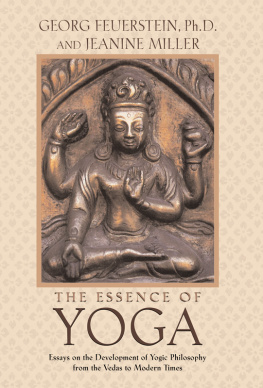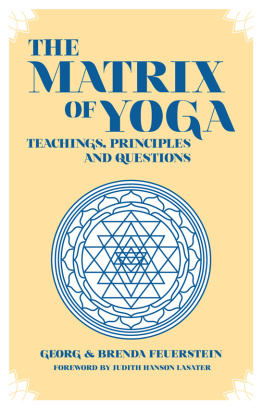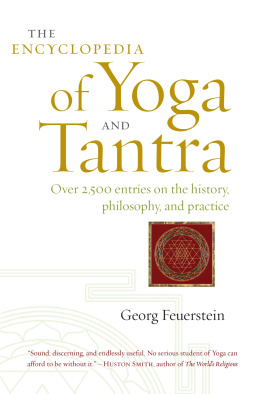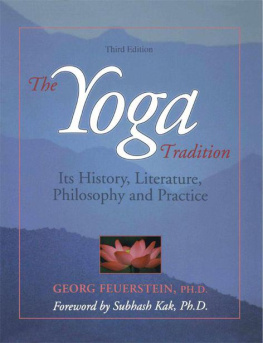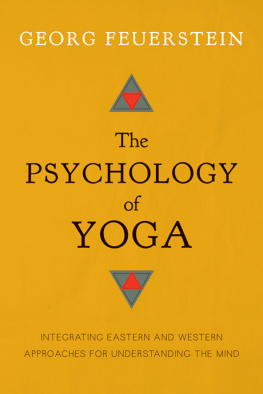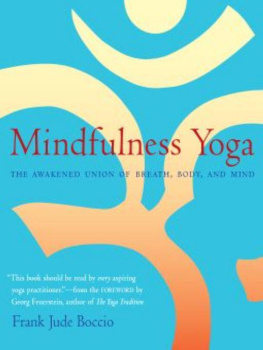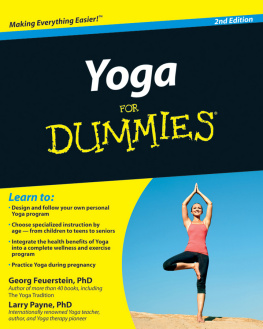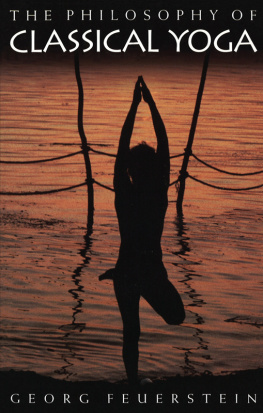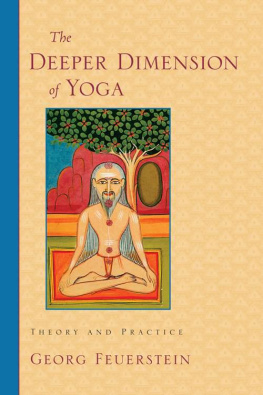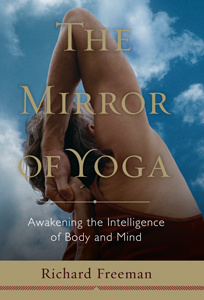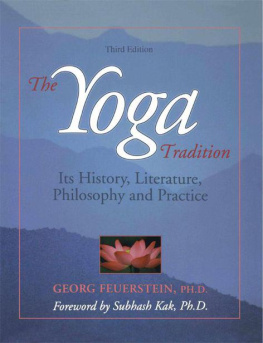THE ESSENCE OF
YOGA
Essays on the Development of Yogic Philosophy from the Vedas to Modern Times
GEORG FEUERSTEIN
AND JEANINE MILLER

Inner Traditions International
Rochester, Vermont
Acknowledgements
Our thanks are due to the authors and publishers for permission to quote from the following works:
A. J. Toynbee, A Study of History, vol. III, Oxford University Press, London.
R. Otto, Mysticism: East & West, Collier-Macmillan Ltd., London.
A. Montagu, The Concept of the Primitive, The Free Press, New York.
T. Dobzhansky, The Biology of Ultimate Concern, Rapp & Whiting, London.
D. T. Suzuki, Mysticism: Christian and Buddhist, Allen & Unwin, London.
A. Eddington, Science and the Unseen, Allen & Unwin.
A. Huxley, The Perennial Philosophy, W. Collins Sons & Co., London. Shree Purohit Swami, Aphorisms of Yoga, Faber & Faber, London.
E. Underhill, Mysticism. A Study in the Nature & Development of Mans Spiritual Consciousness, Methuen & Co., London.
M. Eliade, Yoga: Immortality & Freedom, Routledge & Kegan Paul, London.
M. Eliade, Shamanism, Bollingen Foundation, New York.
R. C. Zaehner, Mysticism: Sacred & Profane, Clarendon Press, London.
J. Ellistone, The Signature of All Things, Dent & Son, London.
L. Renou, Religions of Ancient India, Schocken Books, New York.
Elmer OBrien, The Essential Plotinus, New American Library, New York.
J. Gonda, The Vision of the Vedic Poets, Mouton & Co., The Hague, Netherlands.
S. S. Suryanarayana Sastri, The Bhamati, Theosophical Publishing House, Adyar, India.
Shri Aurobindo, On the Veda, Shri Aurobindo Ashram, Pondicherry, India.
A. B. Purani, Sri Aurobindos Vedic Glossary, Shri Aurobindo Ashram.
V. S. Agrawala, Sparks from the Vedic Fire, School of Vedic Studies, Varanasi, India.
J. Gebser, Ursprung & Gegenwart, Deutsche Verlagsanstalt, Stuttgart, Germany.
J. Quint, Meister Eckehart, Carl Hanser Verlag, Mnchen, Germany.
Portions of the essay on Agni and the note on gvedic interpretation were published in Hinduism, Journal of the Bharat Sevashram Sangha, London Branch.
Abbreviations
BhG | = Bhagavad-Gt |
Bh. Up. | = Bhadrayaka-Upaniad |
gv. | = gveda(-Sahit) |
TV | = Tattva-Vairad |
Up. | = Upaniad |
YBh. | = Yoga-Bhya |
YS | = Yoga-Stra |
These abbreviations are restricted to the footnotes and used in the main text only when in a secondary position. Other abbreviations are obvious.
Preface
The problems which we have to face today are, whether we like it or not, of a profound religious nature or, to put it differently, are related to man as the heir to transcendent reality. The same questions that concern us at present perturbed man in India many centuries ago in a very similar way. It is axiomatic therefore that we should give serious attention to Indian spirituality, however strange the formulations and solutions of the Eastern mind may seem to us at first. We cannot afford to ignore the psychological-cum-philosophical findings of the old Indian culture which reached a high religious and philosophical maturity at an early time and which, on account of its rich experiences over more than four millennia, can be of incomparable help in the present struggle of Western man.
Our special attention must be paid to Yoga, for it is in a way the most precious concentrate of all the spiritual riches of India. Its true value has hardly been recognised in the Western world. This is mainly due to the fact that from the beginning Yoga was seen, both by scholars and others concerned with it, from an outside point of view. Apart from a few exceptions, there has been little genuine endeavour to follow the Yogic path and to test its methods and verify its statements experimentally. The German physician and depth psychologist Dr. H. Speer bluntly stated that the scientists wishing to approach the real nature of Yoga must submit themselves to its practical application at least for a few years. Western man loves to theorise and likes to withdraw from practice. Although almost two hundred years ago Kant had by way of logic shown that the intellect is not capable of solving the deeper metaphysical problems, what could be called the jungle of Western metaphysics is nevertheless steadily continuing to expand.
In Yoga metaphysical questions play a minor role. To the yogin philosophy is never the final object; his aim is to actually experience that which for Kant was the everlasting object of human mind, the reality beyond the phenomenal world. Long before the Critique of Pure Reason was written, yogins in the East had recognised the insufficiency of the intellect with regard to the cognition of final truths. They did not, however, fall into the fatal error of overlooking this fact in their statement of the problem of mans nature, as is generally the case nowadays, but they sought after a faculty in man which might break through the limits of the mind. And, as they assure us again and again in their writings, they have discovered a waythe method of Yoga. Even if we are not willing or prepared to follow Yoga up to its very heights, a profound theoretical and practical study of it would undoubtedly lead to many a remarkable discovery, particularly in the fields of psychology, depth psychology and parapsychology which may well be called sciences of the future.
Yoga, if unlocked by personal practice, could prove to be of a far greater value towards a re-moulding of human personality and thus of our age than any other science, religion or philosophy, for it opens to us a completely new aspect of existencethe realm of the Self beyond personality and phenemonal world.
The present book is, as the title suggests, a collection of essays endeavouring to portray the living pulse of Indian philosophy, the art and science of Yoga. Stress was laid on a general appraisal or, rather, reappraisal of this extremely ancient teaching. The introductory essay is meant to give an outline of Yoga, particularly in its classical form. We have dwelt at length upon the central technique of Yoga, the practice of samdhi or enstasis, often misleadingly called ecstasy. In this connection we have especially treated the question of the succession of the diverse enstatic grades according to classical Yogaa theme which has hitherto been greatly misrepresented. The second essay is a prelude to the subsequent articles on ancient Indian spirituality. It gives out the basic principles of our attempts at interpreting the Vedas, particularly the gveda, which is the fountain-head of all later Indian systems of thought. As already stated by H. D. Griswold, no real understanding of later Hinduism is possible without a knowledge of the probably oldest literary monument of mankind, the gveda. This is particularly true of Yoga, the basic practices and conceptions of which can be traced back to this archaic scripture. To show this is the aim of the essays on (i) the kein-skta which contains references to very old notions and practices showing great similarity to those of later Yoga, on (ii) the hymn of creation (nsadya-skta) which foreshadows the ontological teachings of the epic and classical Yoga-Smkhya traditions, and on (iii) Agni, the grand figure of the gveda, who heralds the Upanisadic
Next page
